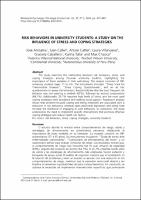Risk behaviors in university students: a study on the influence of stress and coping strategies

View/
Author(s)
Anicama, José
Caller, Juan
Catter, Arturo
Villanueva, Laura
Caballero, Graciela
Talla, Karina
Chauca, Max
Date
2024Metadata
Show full item recordPublisher
Behavioral Psychology
Journal
Behavioral Psychology
Abstract
The study examines the relationship between risk behaviors, stress, and coping strategies among Peruvian university students, highlighting the importance of these variables in their well-being. The sample consisted of 581 university students (ages 17 to 45). The instruments included: “Stress Scale for Transmissible Diseases”, “Stress Coping Questionnaire”, and an ad hoc questionnaire to assess risk behaviors. Results indicate that the most frequent risk behavior was not wearing a seatbelt (65%), followed by alcohol consumption (64.1%). Additionally, 25.7% reported high levels of stress, and the most used coping strategies were avoidance and seeking social support. Regression analysis shows that problem-focused coping and being employed are associated with a reduction in risk behaviors, whereas open emotional expression and being male increase the likelihood of engaging in such behaviors. In conclusion, the study underscores the need to implement specific interventions that promote effective coping strategies and reduce health risk factors. KEY WORDS: risk behaviors, stress, coping strategies, university students.
Type
info:eu-repo/semantics/article
Rights
info:eu-repo/semantics/openAccess
Language
eng
Collections
- Psicología [75]

